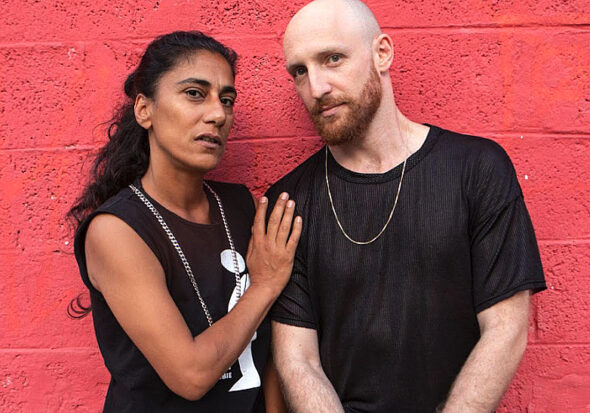
Samira Saraya, left, and Neta Weiner of cross-cultural hip-hop collective System Ali will remotely join area musicians Tronee Threat, ArtGod and JaySwifa for a Saturday, Nov. 22 performance at the Foundry Theater. (Submitted photo)
‘No Visas’ for Foundry artists
- Published: November 21, 2025
The upcoming Foundry Theater performance “NO VISAS בלי רשות بدون جواز” arrives this weekend under a moniker that describes, in brief, the experience of putting the show together: The two headlining artists, Neta Weiner and Samira Saraya of System Ali, had planned to perform in Yellow Springs and elsewhere in the state this summer, but were not issued visas to enter the United States. Their statewide tour was, it seemed, stopped at the border.
Rather than concede, Saraya, Weiner and Ohio collaborators — who had already committed months of work — instead joined forces across three countries and three time zones to put together a show that both acknowledges and defies the attempted barrier.
The performance, “NO VISAS: A Hip-Hop Journey from Jaffa to Jerusalem to Yellow Springs,” will take place Saturday, Nov. 22, at 7 p.m., at the Foundry Theater. The hybrid production will blend film, narration, remote performance and live sets by Ohio hip-hop artists JaySwifa, Tronee Threat and ArtGod; Weiner and Saraya will join the event virtually for a post-show Q&A.
System Ali’s story begins in Jaffa, once a major Palestinian cultural center until many of its residents were displaced in the late 1940s. Now part of Tel Aviv, Jaffa is home to both Palestinians and Israelis, and it was against this cultural backdrop that System Ali formed in the mid-aughts in a bomb shelter. The space belonged to the Sadaka-Reut organization, a partnership of Palestinian and Jewish activists; several of the young adults who would become part of the original 10-member System Ali line-up had worked to establish a youth cultural center in Jaffa through Sadaka-Reut.
“There was this initiative of creating a space … dedicated to artistic creation that is born out of a discussion or a clash between different narratives, ideas, languages — which is something that is a bit unheard of in our reality, unfortunately,” said Neta Weiner, a co-founder of System Ali, in an interview this week. “This work gave birth to an ensemble, a band.”
The nascent System Ali met each week to jam and collaborate on a sound that would eventually fuse hip-hop with musical elements that reflect the diversity of its members; the group’s most recent album, “Maharajan,” samples Russian songs, army band chansons, classical Arab music, jazz and klezmer.
When a wave of eviction and demolition orders hit Jaffa in 2006, the group climbed onto the roof of the shelter for their first performance during a housing rights demonstration.
“In the heart of it was a group of five rappers singing about their lives in Hebrew, Arabic, Russian, English, Yiddish and Amharic — the sum of all our mother tongues,” Wiener said.
Ultimately, the bomb shelter/cultural center was taken away from the group — but System Ali had emerged, and found a new place to gather and work in Holon, which the group named Beit System Ali, or System Ali House. Two years later, Beit System Ali grew into a larger collective that develops political campaigns alongside educational programming.
“And it’s always on the triangle between artistic creation, education and activism, which are the same thing for us,” Weiner said.
It was within this ecosystem that local resident Angie Hsu first encountered the ensemble as a young grant writer in Tel Aviv-Jaffa. She told the News she was writing grants for Sadaka-Reut in 2011, and though she didn’t know the group personally, she was familiar with System Ali’s story, which she said bolstered her perspective on the work she, in turn, was doing.
“I was 23 years old and entering this world of social justice and human rights activism and … System Ali really represented this positive energy and passion,” Hsu said. “I was very young and learning a lot about this very complex, heartbreaking, nuanced, difficult geopolitical situation, and it was overwhelming and sad and hard — yet I was also learning about the lightness and the joy and the humor and the art. … In America, we often don’t see that angle of the work that’s happening there.”
Making that angle visible in the United States through the work of System Ali, Hsu said, became something of a “personal obsession” for her; over the course of about seven years, she would periodically reach out to the group to test the waters on a possible collaboration or performance. In 2024, when Weiner and Samira Saraya were in the United States, that possibility lined up: Hsu contacted local resident Kevin Lydy, chair of the Dayton Sister City Committee, whose partnership with the city of Holon offered a formal channel for a visit. Lydy said he remembers the initial pitch arriving with an urgency to move before the artists left the country again.
“We didn’t really know what it was going to look like, or what we were planning to do,” Lydy said. “We said, ‘OK, let’s try to jump on this now.’”
It took about a month or so of planning, but Saraya and Weiner came to the Miami Valley for a just-shy-of-two-days whirlwind of meetings and introductions.
“And in those less than 48 hours, they shared so much about themselves, and we all became excited about what was possible,” Hsu said.
Weiner added that the short trip “felt like a lot more” than two days, as those involved felt the “connection and the solidarity” of learning that there were pockets of potential collaboration in a place they “didn’t even know existed before.”
“It really changed things for us,” Weiner said.
He and Saraya left Ohio with intentions to return this August for a wider tour. Hsu and Lydy began lining up hosts, workshops, concerts and community partnerships. Local organizers in Yellow Springs, Dayton and beyond prepared for a rare cultural exchange.
But the visas never came. The denial, delivered late in the process, was crushing, Weiner said.
“Within one Zoom call, which was hard, it broke our hearts,” Weiner said. “We’d been building on this, spending all this time preparing it, preparing our families, preparing our band members.”
But no one walked away. The organizers said quitting felt like conceding to the very forces that had kept the artists out. As Hsu put it: “That’s what they want. They want to break us. They want to make us stop collaborating.”
“It’s a war on the ability to speak, the ability to be together, the ability to bring different ideas,” Weiner added. “The borders are closing. This project is called ‘No Visas’ for a reason.”
Saraya, who is Palestinian-Israeli, nodded wryly to the slogan of Theodor Herzl — the founder of modern political Zionism: “There is a sentence in Hebrew based on the establishment of the Zionist country — ‘Tirtzu, Ein zo Agadah’ — and people who understand it will laugh, but it’s a true sentence: If you want something, it’s not a fantasy. You can achieve it. … As long as we are in a movement and we refuse whatever they want us to be, whatever they want us to do, we will find our way — and here we are. We found our way.”
Turning what would have been a tour into a remote collaboration required improvisation and patience, the group said. But over months of late-night messages, shared beats and Zoom calls, Saraya, Weiner, village artists Tronee Threat (Tron Banks) and ArtGod (Joshua Whitaker) and Columbus-based artist JaySwifa built two original tracks and a hybrid performance that reflects their varied backgrounds.
Those backgrounds were central to the process — especially the political and social differences each artist brought into the room, which Weiner said sometimes surfaced in the creative process in ways that surprised everyone. He recalled a long discussion about the word “peace,” which the Ohio artists had initially proposed as a grounding theme for the performance. For him and Saraya, Weiner said, the term carries a history of political misuse.
“It’s a word that was abused and misused and manipulated to cover up for war crimes and supremacy; we can’t even use the word ‘peace,’” he said. “But the three amazing rappers from Ohio said, ‘This is a real thing, peace is a value, something to put out there.’ It’s a different reality, but we also understand each other, so it was beautiful to realize that.”
“For me, we are not so different,” Saraya said. “We are people that suffer from the system — and it doesn’t matter the name of the system, whether it’s based on our color of skin or our DNA, our identity, our sexual orientation. The difference between us is smaller than the similarity.”
While the collaboration unfolded across screens, the final work is meant to immerse the audience fully; Hsu said the artists aim for audiences to “be engulfed” in the performance. She noted that ArtGod asked Foundry Theater organizers for a proper hip-hop sound check: “He said, ‘I want the music to be played like hip-hop should be played — you feel it through your body.”
Saraya said the audience should indeed be ready for an embodied experience: “They should be prepared for a hell of a good music that will make them dance and move their asses,” she said. “It’s art that moves not just your body, but also your heart and your brain.”
Weiner said he hopes the audience will take courage from the work the five artists have put together, noting that fear is often used to silence voices in times of political and social turbulence.
“You know, in Hebrew, the words for ‘community’ and ‘audience’ are almost the same word — kehila ( קְהִלָּה) and kahal (קָהָל). It’s one letter that separates the two,” he said. “Obviously, reality is very frightening and everyone’s afraid of the price they might pay, but the price you pay for keeping silent is much, much higher. … So if there’s one thing I hope we can give, it’s courage.”
“NO VISAS בלי רשות بدون جواز” begins at 7 p.m. Saturday, Nov. 22. The event will feature performances from the individual artists, as well as narration and film segments documenting the process of making music together. The show will end with a live-filmed performance of the two tracks created by all five artists. A Q&A session, featuring Samira Saraya and Neta Weiner via video call, will follow the performance. Tickets are $20 for general admission and $5 for students, and are available online at http://www.bit.ly/NoVisasFoundry.
The performance is produced by Mad River Theater Works, with support from the Ohio Arts Council, the YS Community Foundation, the Dayton Sister City Committee and the Iddings Foundation.
The Yellow Springs News encourages respectful discussion of this article.
You must login to post a comment.
Don't have a login? Register for a free YSNews.com account.













No comments yet for this article.